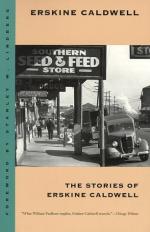|
This section contains 998 words (approx. 4 pages at 300 words per page) |

|
SOURCE: "Southern laughter," in The New York Times Book Review, April 25, 1943, p. 6.
In this review, Du Bois considers Georgia Boy "an unalloyed delight" and declares that one "would have to go back to Huck Finn to find a more companionable storyteller" than William Stroup, the narrator of these linked stories.
Erskine Caldwell has come back from the steppes at last. He returns with a heart-warming book about the South he understands so completely, a book in which the Caldwell trademarks of dry rot, degeneracy and despair are conspicuous by their absence. His admirers may rejoice now that his stint as a Russian correspondent has ended.
Georgia Boy might well have been subtitled "life With Father on the Tobacco Road." The comparison between Clarence Day and the Morris Stroup of these light-hearted sketches is inevitable—and more apparent than real. Both characters are "universals" in the best sense of...
|
This section contains 998 words (approx. 4 pages at 300 words per page) |

|


